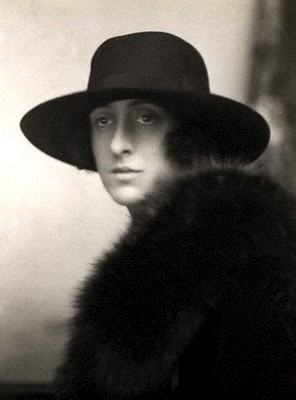Across the Mountains with
The Bakhtiari Tribe
Vita Sackville-West
(Tauris Parke)

They spent twelve days on the Bakhtiari Road --- less a road than a path --- often obliterated by mud and the centuries of wayfaring strangers. Sackville-West's small army passed through towns (many mere mud-wattle huts) with names like Gandom Kar, Do-Pulan, Qaleh Madrasseh, Gurghir, and one that sounds like a contemporary English punk rock group, Deh Diz.
The charm of Twelve Days in Persia is not the journey itself. That itself was arduous, as such trips are, arduous: travellers being alternatively cooked and frozen, up-stream and down rock-strewn, ill-marked, confusing paths --- sometimes lost on the edge of impossible precipices with the Karoun River roaring far below.
The joy of this is being allowed to stop off for awhile in the brain of Sackville-West. She is funny, wise, and well aware of herself. She's also one of those redoubtable post-Victorian ladies who went everywhere in the world with a canvas tote-bag, a foldable portable chair, a kerosene lamp, a tea cozy ... and her own indomitable self, challenging the boring image of the English woman as a retiring homebody.
Vita is crazy about plants, and part of her reason for going to god-forsaken Persia was to find, if you will believe it, an iris, called reticulata. Which ultimately evaded her.
She was vexed to find a mere narcissus ("but I was not looking for the narcissus" she writes) and grape hyacinths ("not worth bringing home, for, unlike the Italian variety, they were entirely without scent.") She complained of this failure to one of her companions --- Gladwyn Jebb --- but he was no help. He had come not seeking iris bulbs but to "look for partridges." Ah, those English eccentrics.
Sackville-West --- great name: and she's a Vita, too --- calls this a travel book, but we mostly get to ramble through her mind, for on this ancient road, outside of the startling vistas, there are but a few hundred herdsmen, a few thousand goats, and the huts of the desperately poor. Vita spends a chapter, as she soldiers on through Qaleh Madrasseh, contemplating what it would be like to live a life of seclusion here:
- Glutted and weary with information, confused with creeds, the old words knocking against one another in the brain and producing no more than a tinny clatter, one would settle down either to a stagnant repose or else to a concentrated readjustment of values.
We have to recall that this is a time with little to entertain one outside of one's own companions. There are no telephones, certainly few radios, and that only in the big cities (she tells of two Englishmen who come together once a week in Tehran to but listen to the gong of Big Ben on an ancient receiver).
There is no internet, no movies or CD players, and certainly no blustering Americans invading from the west. Oil? That there is, at the end of Vita's journey ... in a smelly, smoky camp of the Anglo-Persian Oil Company, later to become British Petroleum: but this outpost is quite bleak in comparison with the mountains and valley we've just been through.
It goads her to speculate on the sights along the 150 mile Bakhtiari Road we've just journeyed: gorgeous valleys, noisy rivers, wild mountain sides ... and now, just past the ancient city of Persepolis, "the greedy, inquisitive importunities of man." She thinks some on the oil fields:
- Did trees or did millions of fish perish to light our boarding-houses and drive our motors?
All good travel books should make you want to be going along with the writer. This one certainly does. Sackville-West appears in her photographs as a lithe, regal, fetching lady ... certainly making us ache to be back in there with her in the 20s, to be there striding through those goat-infested barrens.
For her eye is impeccable: for the flowers, for the mountains, for the herdsmen and their hardy women, their (often) sickly children: for anything of life amidst the dust and stones.
This, for instance, her praise for The Mouse --- her donkey ... the one who had been assigned "not to humiliate me, but to relieve my weariness." Mouse turned out to be
- small, passive, obliging, so that I very soon conceived a great affection for her and began to talk of bringing her back to England.